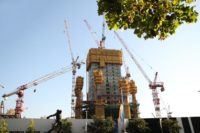Construction contractors have enhanced collection remedies to help them obtain payment. Two of the most commonly used remedies are mechanics liens and stop payment notices. These rights are based on the California Constitution and various statutes.
On July 1, 2012, the rules and procedures affecting mechanics liens, stop payment notices and bond claims changed (SB 189 and 190). New forms and procedures are required. A prior blog dealt with other changes to these laws that took place in 2011.
The following information is meant as general information only. One should not use this information to calculate the timing deadlines of these procedures. It is essential to take into account the specific facts and circumstances of each situation because they affect the timing, notice, and procedures. If the circumstances in this blog pertain to you or your company, contact our office to obtain advice on how to use them.
A Mechanics Lien allows a contractor to record a lien against the property that the contractor improved, giving the contractor a source from which to satisfy a judgment. A Stop Payment Notice (previously called a stop notice) enables a contractor to force an owner or a bank to set aside undisbursed construction funds held by them. Contractors are required to follow procedures to perfect their mechanics lien claim, stop payment notice rights, and bond claims, some of which are described in this blog. Failure to do so will result in waiver of those rights.
Preliminary Notice Enforcing contractor rights begins with the Preliminary Notice. The Preliminary Notice reaches backwards for 20 days and lays claim to the services, supplies, and materials provided by the contractor to the work of improvement. The Preliminary Notice form was revised in 2012 to distinguish between public and private projects.
At the start of every construction project, a contractor that does not have a direct contract with the project’s owner must serve a Preliminary Notice. This is necessary to preserve their mechanics lien claim, stop payment notice rights, and bond claims. Not only is it a required first step, failure to give a Preliminary Notice constitutes grounds for discipline under the Contractors’ State License Law.
The Preliminary Notice must be served on certain parties involved in a construction project. Failure to properly serve it will result in the loss of mechanics lien, stop payment notice, and bond rights. It is also imperative to preserve proof of compliance with the service requirements.
The rules for service of the Preliminary Notice depend on a number of factors. As one example, even when a contractor has a direct contract with the owner, the contractor must still give a preliminary notice to the construction lender. A Preliminary Notice must be served on the bond company. The service requirements for the Preliminary Notice are too variable to fully address in this summary. Consult this office for assistance.
This blog is continued in Part 2.
This information is provided for informational purposes only and should not be construed as legal advice. It should not be acted upon without consulting a licensed California attorney about the facts, particular needs and questions of the person or entity considering these issues. Contact this office for assistance with your mechanics lien, stop payment notice, and bond questions.
